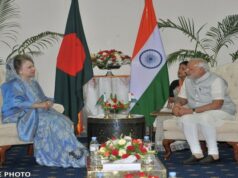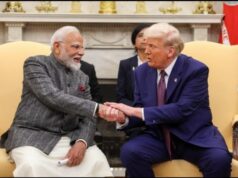Three weeks after Bangladeshi Prime Minister Sheikh Hasina abruptly arrived in New Delhi aboard a CJ130 military transport aircraft, the flurry of charges and counter-charges mixed with a deadly dose of disinformation continues unabated.
Hasina left Dhaka in a hurry on August 5 after a student protest against quotas spiralled into a violent anti-government movement and the death of hundreds across the country.
A day after her arrival in Delhi, there were reports that she had written a resignation letter in which she had blamed the Americans for her downfall, apparently over her refusal to hand over a strategic island in the Bay of Bengal for a U.S. base.
The next day, her son, a businessman based in the U.S., said his mother had not written any such letter.
With hours of Hasina’s departure, her official residence in Dhaka was stormed by students, and there were reports of growing violence against minorities and Awami League supporters.
First they came for the Hindus and Ahmadis…
Then they came for the Sufi shrines…#Bangladesh https://t.co/TEXDwrKILF
— FJ (@Natsecjeff) August 31, 2024
Several judges, lawyers, bureaucrats and professors suspected to have Awami League links were reportedly forced to resign.
An interim government led by chief adviser and Nobel Peace laureate Mohammad Yunus — who took the oath as Chief Adviser on August 8 — and a bunch of student leaders was quickly formed.
The new administration, which is yet to announce any timelines for elections, denounced India for sheltering Hasina and also for deliberately releasing water from dams and barrages on rivers near the border with Bangladesh in order to “teach it a lesson”.
It also released the main opposition Bangladesh Nationalist Party chief Khaleda Zia, known for her ties to Islamist parties and her virulently anti-India position, from house arrest along with other opposition leaders.
And on Wednesday, it lifted the ban on the Bangladesh Jamaat-e-Islami, a major Islamist party which had opposed the independence of Bangladesh in 1971 and joined the Pakistani army’s pogrom against Bengalis.
Most of the party’s senior leaders have been executed or jailed for crimes against humanity, including killings, abductions and rapes, committed in 1971.
Jashimuddin Rahmani, chief of another Islamist outfit Ansarullah Bangla Team (ABT), known for its Al Qaeda links, was also freed by the Yunus-led administration.
Even as Hindus and other minorities took to the streets to protest against the violence against them, pictures of rabid Islamist leaders moving around with police and military protection surfaced.
Caretaker government of Bangladesh releases Jashimuddin Rahmani, the chief of the Ansarullah Bangla Team, an Al-Qida-affiliated outfit.
Secularism at its best in Bangladesh!! pic.twitter.com/c5E4BM0nAN— The Story Teller (@IamTheStory__) August 29, 2024
Yet in a column titled “10 things that India needs to know about Bangladesh,” Zafar Sobhan, the editor of the Dhaka Tribune, insisted that “The movement that toppled Sheikh Hasina is not an Islamist revolution.”
He touted reports about Muslim students protecting Hindus from rampaging mobs – of other Muslims — to claim that minorities in Bangladesh were safer than minorities in India.
Others disagree.
“The concept of secular Bangladesh is at high risk,” says Bangladeshi political commentator Tabrez Rumi. “Prime Minister Hasina was compelled to leave the country for the sake of her life. Later we came to know that she didn’t resign as prime minister.”
“Let me be clear,” he went on. “The quota movement of the students was initially peaceful, and the government took it lightly. But after few days the movement was hijacked by Islamic militant groups, with the Jamaat taking the lead. They killed some students, and the government eventually fell.
“This wasn’t a student movement or a mass movement, it was an orchestrated movement carried out by the U.S. and its allies,” he said.
According to Rumi, “the Jamaat and other banned Islamic militant groups like the Hizb ut-Tahrir (which wants a global Islamic caliphate under Sharia law) and Ansarullah Bangla teams were behind the carnage that engulfed Bangladesh. They killed policemen and looted weapons from the police stations during the agitation.”
The Hasina government had banned the Jamaat just days before she fled Dhaka.
The media won’t cover the atrocities Hindus face in Bangladesh because they played a role in causing this pogrom.
The opposition was always Jamaat E Islami, but they fell for the “student protest” angle, and they would rather watch a million Hindus die than admit they were wrong. https://t.co/fNQoCMvghy— Daniel Bordman (@DanielBordmanOG) August 20, 2024
“But today,” he said “the interim government led by Dr Yunus lifted the ban. Which will lead Bangladesh back to the stone ages. Hindus and other minorities as well as progressive, liberal people are now at high risk. And India will have to pay the price for it.”
Why did Dr Yunus do this? “Because he wants to ruin the concept of secular Bangladesh and is trying to set a war zone for his friend, the United States. They also plan to unsettle the seven sisters zone of India,” says Rumi.
Meanwhile, the BNP and the Islamists freed from captivity by the interim administration are hunting down Awami League leaders and activists. Several have been arrested, some have been lynched.
On August 23, Awami League leader MA Momin Patwari, 52, who was severely injured in an attack while paying homage to the portrait of Bangabandhu Sheikh Mujibur Rahman at Dhanmondi on August 15, succumbed to his injuries at Green Life Hospital in Dhaka.
Earlier, the interim government cancelled the holiday declared for August 15, the death anniversary of Mujib, observed as National Mourning Day.
Retired Supreme Court Justice AHM Shamsuddin Chowdhury Manik, who was among the judges that handed out death sentences to the Razakars or those who supported the Pakistani genocide on Bengalis in the early 70s, was arrested near Sylhet’s Zakiganj border while ‘trying to flee to India’ on Friday.
During his court appearance on Saturday, an agitated crowd attacked him, while others hurled eggs and shoes at the former judge, who was hospitalised with serious injuries.
Another Awami League leader Ishaque Ali Khan Panna was found dead in a betel nut plantation near the India-Bangladesh border in Meghalaya’s East Jaintia Hills district on August 26.
But a former Bangladeshi official, requesting anonymity given the “current dynamics” in the country, said that three weeks was too short a time to judge a country that had “reclaimed its glorious heritage after a struggle in which many young people lost their lives”.
“Sheikh Hasina might have been India’s friend but she was no longer a friend of the people of Bangladesh,” he said. “And we know that India rebuffed several overtures made by Khaleda Zia’s Bangladeshi Nationalist Party to the Narendra Modi government, at Hasina’s behest,” he added.
While admitting that the BNP and the recently freed Islamists had a “long-standing grudge against India,” he said it was important to remember certain things while dealing with Bangladesh.
“One, that the country’s founding father, Bangabandu Mujibur Rahman, was no saint. He may have led the country to Independence but he was also responsible for serious human rights violations, for the terrible famine of 1974 and for massive nepotism. His daughter Hasina seems to have inherited some of those traits,” he said.
It’s not the just the statue of Mujib ur Rehman which is being targeted, ALL statues are being targeted!!
Does that give you a hint of whats happening in Bangladesh? https://t.co/YD082uprmT— औरंगज़ेब 🇮🇳 (@__phoenix_fire_) August 29, 2024
“Two, we should not forget that our liberation war was not due to religious but linguistic reasons, against the imposition of Urdu on us by the Punjabis of West Pakistan. Our villagers chased away the Bangladeshis who joined the Taliban but returned with their tails between their legs from Afghanistan when the West started bombing it after 9/11.”
“Yes, we are a religious people but we are also proudly secular… these attacks on minorities are an aberration, and those responsible will eventually be punished,” he insisted.
“It is you Indians who are pushing gullible youngsters into the arms of the radical outfits with your bully tactics and interference in our sovereign affairs,” he added. “Who are you to advise us to hold our elections soon?”
New Delhi, meanwhile, has made it clear that it is willing to work with any legitimate government in Dhaka, and that it was concerned over the attacks on Hindus in the country.
It has also made clear that it would hold the government responsible for any terrorist attack on India emanating from Bangladeshi soil.
But for Tabrez Rumi, that is not enough.
“India must respond quickly and strongly to the situation,” he warns. “Otherwise, it will be too late.”
In a career spanning three decades and counting, Ramananda (Ram to his friends) has been the foreign editor of The Telegraph, Outlook Magazine and the New Indian Express. He helped set up rediff.com’s editorial operations in San Jose and New York, helmed sify.com, and was the founder editor of India.com.
His work has featured in national and international publications like the Al Jazeera Centre for Studies, Global Times and Ashahi Shimbun. But his one constant over all these years, he says, has been the attempt to understand rising India’s place in the world.
He can rustle up a mean salad, his oil-less pepper chicken is to die for, and all it takes is some beer and rhythm and blues to rock his soul.
Talk to him about foreign and strategic affairs, media, South Asia, China, and of course India.





